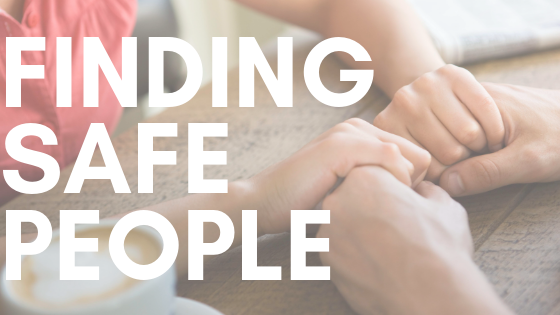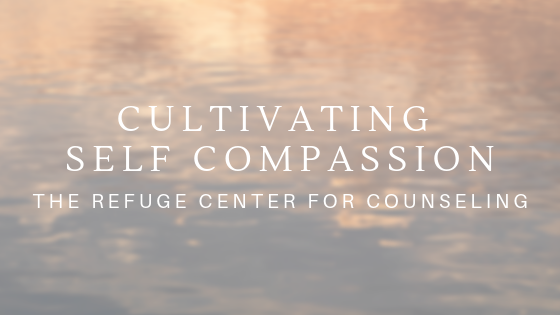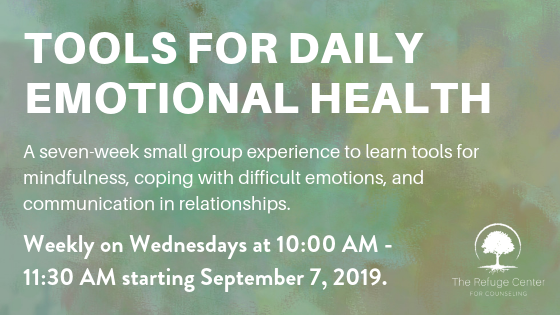Part five in a six-part blog series “How to Face a Trial” by Refuge Center Executive Director and Co-Founder Amy Alexander, LMFT
Finding safe people to be vulnerable with.
We heal and recover in the context of relationships. We need the company of safe people who can walk with us when we are hurting.
Throughout our lives, we may not have been taught how to share feelings and needs and how to determine the right people to do that with.
In the midst of hardship, we may feel especially fragile and tender and it is essential that we not only have people near us in these seasons but that they are trustworthy with our story.
Bessel Van der Kolk says, ““You have to find someone who you can trust enough to accompany you, someone who can safely hold your feelings and help you listen to the painful messages….You need a guide who is not afraid of your terror and who can contain your darkest rage, someone who can safeguard the wholeness of you…” (2015, p.177).
These kinds of friends and guides give us permission to tell the whole truth of ourselves and our experiences and their compassion and wisdom lead us towards healing.
We instinctively know it is not safe to be vulnerable with those we cannot trust.
Discernment is so key. But how do we know if we can trust them?
Brene Brown says “You share with people who have earned the right to hear your story. You share with people who can bear the weight of your story” (2015).
These are people with whom we have established a foundation of confidence in their ability to respond with empathy, maintain confidentiality when necessary, honor the uniquely sacred experience of your story, and offer the gentle assurance of their presence.
This is connection.
It happens when we can feel seen, safe, secure, and soothed by another.
These people in our lives might be called soul friends.
They give us the gift of being able to be vulnerable and transparent without the fear of judgement.
What a gift when we have one or more soul friends in our life we can turn to in hard times.
In these seasons we may also benefit from inviting others into our circle who can offer us understanding and support.
This may be a pastor, a professional counselor, a spiritual director, or a mentor.
It is up to us to decide who we can entrust our story to and then to access the courage and wisdom to let them in.
Courage does not mean we are not afraid, but rather, knowing that something is greater than the fear.
In this case, we may fear being open and honest about our struggles, but we can trust that connecting with safe people will bear the fruit of hope.
Having wisdom about what, when, and how to share is also essential.
Allowing ourselves to be selective about who has access to our emotional world is not only reasonable, it is necessary.
Drs. Henry Cloud and & John Townsend, in their book, Safe People, teach us how to recognize the traits of the kinds of people we might want to “invite onto the deepest sections of our acre” (2009, p. 46).
They share that the best example of a safe person is found in Jesus. In him were fount the three qualities of a safe person; dwelling, grace and truth. As John wrote: “The Word became flesh and lived for a while among us. We have seen his glory, the glory of the one and only Son, who came from the Father, full of grace and truth” (John 1:14).
Dwelling
Dwelling refers to someone’s ability to connect with us. The Greek word used here means to “encamp” or “reside.” Safe people are able to “dwell in the flesh.” They are able to connect in a way that we know that they are present with us.
Grace
The second safe quality that Jesus exemplifies is grace. Grace is “unmerited favor.” It means that someone is on our side; they are “for us.” Grace implies unconditional love and acceptance with no condemnation. Relationships in which people shame or condemn us are ultimately hurtful and do not produce growth. They require us to be different that we are in order to be accepted. Love that must be earned is basically useless. Grace does the opposite. It says that you are accepted just like you are and that you will not be shamed or incur wrath for whatever you are experiencing.
Truth
The third quality that Jesus embodied for us was truth. Truth implies many things, but in relationships it implies honesty, being real with one another, and living out the truth of God. Many people believe that safe relationships are relationships that just give grace without confrontation, but ultimately these relationships can be destructive as well.
Connecting with safe people in an authentic ways grows us. When we experience feeling loved, accepted, and known, it increases our capacity for self-reflection and for giving and receiving grace.
Inch by inch, we access more courage, strength, clarity, and confidence.
A connection with a safe person allows us to follow our convictions and to be honest with ourselves and others. The person who is a friend to our soul is the person to whom we can entrust our pain.




